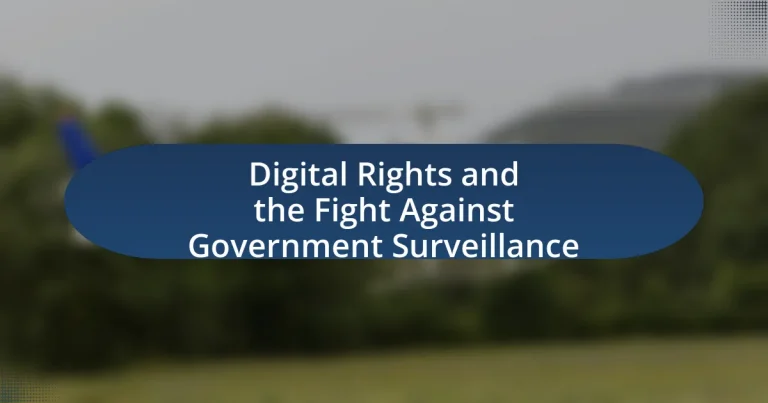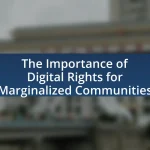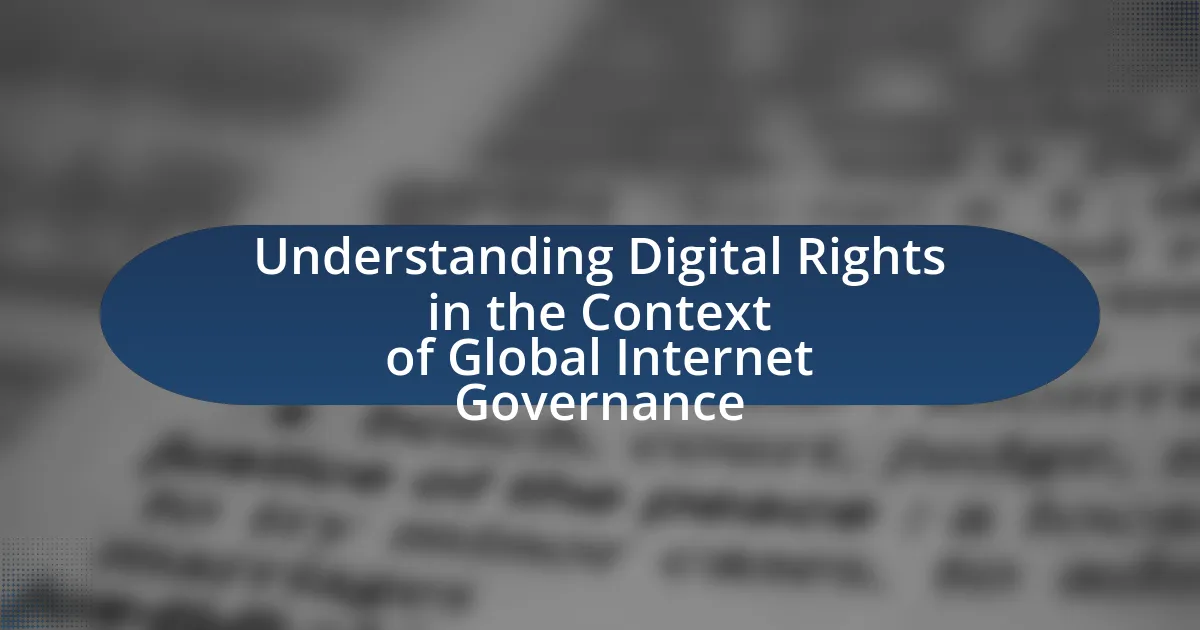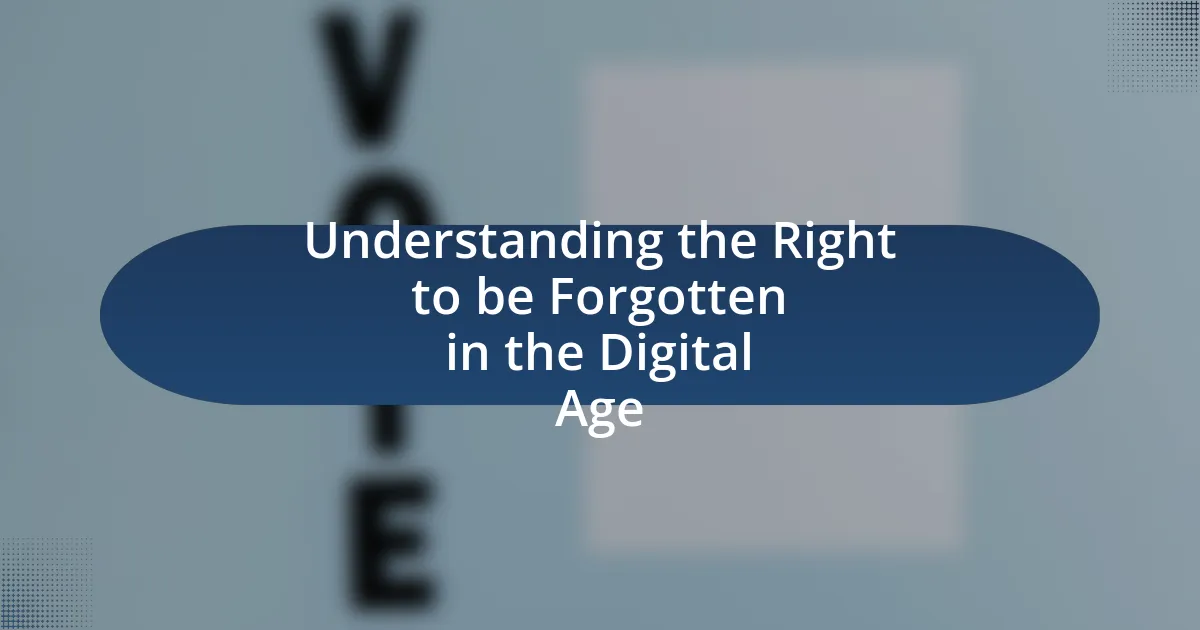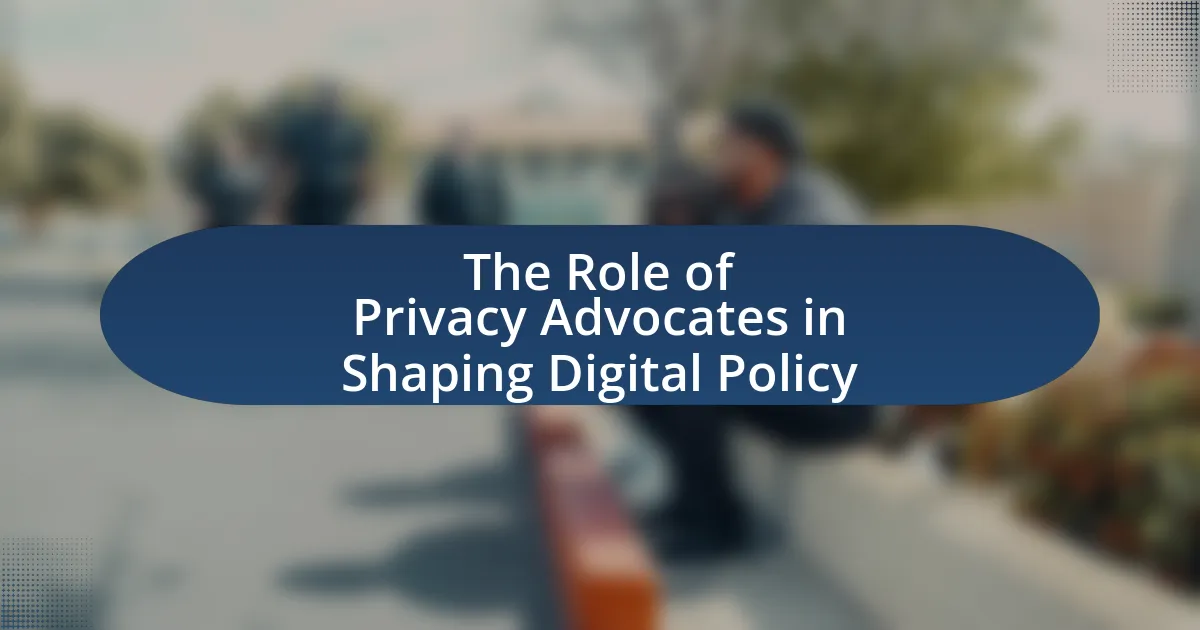Digital rights encompass the entitlements and freedoms individuals possess in the digital realm, including privacy, freedom of expression, and access to information. The article examines the conflict between these rights and government surveillance, highlighting legal frameworks like the General Data Protection Regulation (GDPR) that aim to protect personal data. It discusses how digital rights safeguard individuals against intrusive monitoring, the varying protections across different countries, and the implications of surveillance on privacy and freedom of expression. Additionally, the article addresses the historical context of digital rights, the technologies used for surveillance, ethical considerations, and strategies individuals can employ to protect their digital rights.
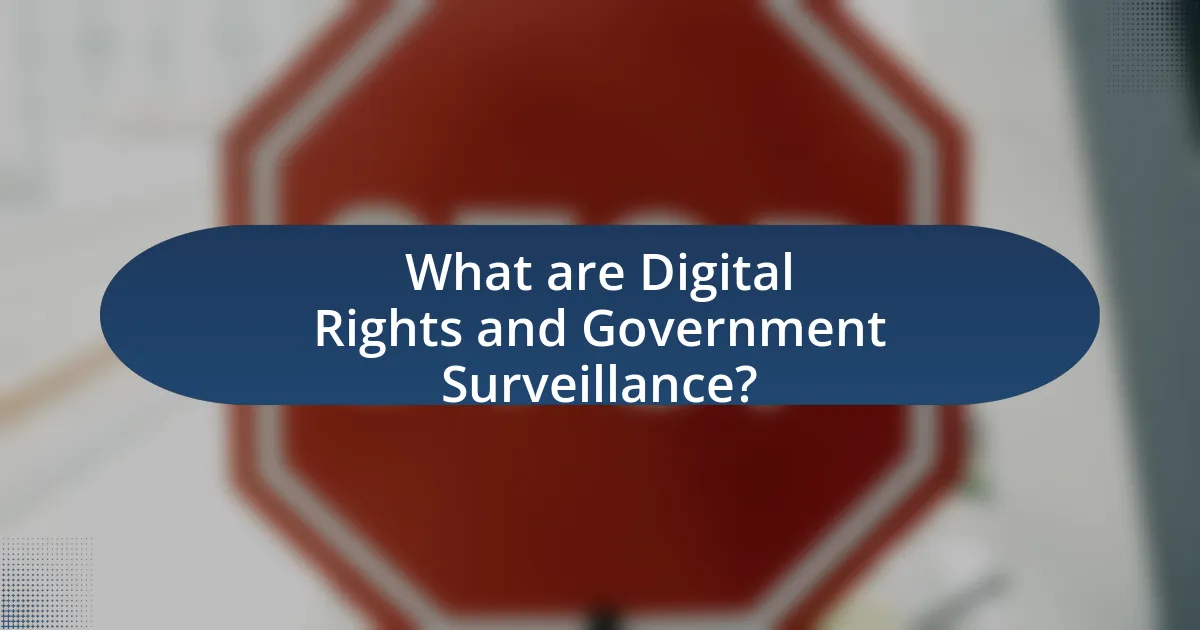
What are Digital Rights and Government Surveillance?
Digital rights refer to the entitlements and freedoms individuals have in the digital environment, including privacy, freedom of expression, and access to information. Government surveillance involves the monitoring of individuals’ online activities by state authorities, often justified by national security or law enforcement needs. The tension between digital rights and government surveillance is evident in various legal frameworks and international agreements, such as the General Data Protection Regulation (GDPR) in Europe, which aims to protect personal data and privacy against intrusive surveillance practices. Studies, such as the 2020 report by the Electronic Frontier Foundation, highlight the risks posed by government surveillance to individual freedoms and the importance of safeguarding digital rights to ensure a free and open internet.
How do digital rights protect individuals in the context of surveillance?
Digital rights protect individuals in the context of surveillance by establishing legal frameworks that limit government overreach and ensure privacy. These rights, such as the right to privacy and freedom of expression, are enshrined in various international treaties and national laws, which provide individuals with mechanisms to challenge unlawful surveillance practices. For instance, the European Union’s General Data Protection Regulation (GDPR) mandates strict guidelines on data collection and processing, empowering individuals to control their personal information and seek redress for violations. Additionally, organizations like the Electronic Frontier Foundation advocate for digital rights, highlighting cases where surveillance practices have been deemed unconstitutional, thereby reinforcing the protection of individual freedoms against intrusive government actions.
What specific rights are considered digital rights?
Digital rights encompass specific rights related to the use of digital technology and the internet, including the right to access information, the right to privacy, the right to freedom of expression, and the right to data protection. These rights are essential for ensuring individuals can engage with digital platforms without undue interference or surveillance. For instance, the right to privacy protects individuals from unauthorized data collection and surveillance by governments or corporations, as established by various international human rights frameworks, such as the Universal Declaration of Human Rights.
How do these rights vary across different countries?
Digital rights vary significantly across countries, influenced by legal frameworks, cultural norms, and government policies. For instance, countries like Sweden and Finland have robust protections for digital privacy, supported by strong data protection laws and a commitment to freedom of expression. In contrast, nations such as China and Russia impose strict regulations on internet usage and surveillance, limiting citizens’ digital rights through censorship and monitoring. According to the Freedom House report “Freedom on the Net 2021,” countries are categorized based on their levels of internet freedom, revealing that 73 countries experienced a decline in internet freedom, highlighting the global disparity in digital rights.
Why is government surveillance a concern for digital rights?
Government surveillance is a concern for digital rights because it infringes on individuals’ privacy and freedom of expression. When governments monitor online activities, they can suppress dissent, limit access to information, and create a chilling effect on free speech. For instance, the 2013 revelations by Edward Snowden highlighted extensive surveillance programs by the NSA, which raised alarms about the erosion of civil liberties and the potential for abuse of power. Such practices undermine the fundamental principles of democracy and human rights, as recognized by international agreements like the Universal Declaration of Human Rights, which asserts the right to privacy and freedom of opinion.
What are the implications of government surveillance on privacy?
Government surveillance significantly undermines individual privacy by enabling the collection and analysis of personal data without consent. This intrusion can lead to a chilling effect on free expression, as individuals may self-censor their thoughts and actions due to fear of being monitored. For instance, a 2013 report by the American Civil Liberties Union highlighted that mass surveillance programs, such as those revealed by Edward Snowden, have resulted in widespread public concern over privacy violations and the potential misuse of collected data. Furthermore, studies indicate that such surveillance disproportionately affects marginalized communities, exacerbating existing inequalities and fostering distrust in governmental institutions.
How does surveillance impact freedom of expression?
Surveillance significantly restricts freedom of expression by creating a chilling effect on individuals’ willingness to communicate openly. When people know they are being monitored, they may self-censor their thoughts and opinions to avoid potential repercussions, leading to a decrease in public discourse and dissent. Research by the Electronic Frontier Foundation indicates that surveillance practices can deter individuals from engaging in political activism or discussing controversial topics, as fear of reprisal or scrutiny becomes a barrier to free expression. This dynamic undermines democratic principles and stifles diverse viewpoints, ultimately harming societal progress and individual rights.
What are the historical contexts of digital rights and surveillance?
The historical contexts of digital rights and surveillance encompass the evolution of privacy laws and government monitoring practices, particularly since the advent of the internet. In the late 20th century, the rise of personal computing and the internet prompted concerns over individual privacy, leading to the establishment of data protection laws, such as the 1995 European Union Data Protection Directive. This directive aimed to safeguard personal data and privacy rights in the digital age.
As technology advanced, government surveillance intensified, notably post-9/11, with the implementation of the USA PATRIOT Act in 2001, which expanded the government’s ability to monitor communications. This period marked a significant shift in the balance between national security and individual privacy rights. The emergence of whistleblowers like Edward Snowden in 2013 further highlighted the extent of government surveillance programs, sparking global debates on digital rights and privacy.
These historical developments illustrate the ongoing tension between the protection of individual rights and the state’s interest in surveillance, shaping the current landscape of digital rights advocacy.
How has technology influenced the evolution of digital rights?
Technology has significantly influenced the evolution of digital rights by enabling greater access to information and facilitating communication, which has led to increased awareness and advocacy for privacy and freedom of expression. The rise of the internet and mobile devices has empowered individuals to share information rapidly, resulting in movements that challenge government surveillance practices, such as the Arab Spring and various privacy campaigns. Additionally, advancements in encryption technologies have provided users with tools to protect their data from unauthorized access, reinforcing the demand for stronger digital rights protections. For instance, the introduction of end-to-end encryption in messaging apps has sparked debates about user privacy versus national security, highlighting the ongoing tension between technological capabilities and the need for regulatory frameworks that safeguard digital rights.
What major events have shaped the current landscape of surveillance?
The major events that have shaped the current landscape of surveillance include the September 11 attacks in 2001, which led to the implementation of the USA PATRIOT Act, significantly expanding government surveillance capabilities. The Edward Snowden revelations in 2013 exposed widespread NSA surveillance programs, prompting global debates about privacy and government overreach. Additionally, the rise of digital technology and social media has facilitated both surveillance practices and public awareness, influencing legislation and public opinion on digital rights. These events collectively highlight the tension between national security and individual privacy rights, shaping ongoing discussions and policies regarding surveillance.
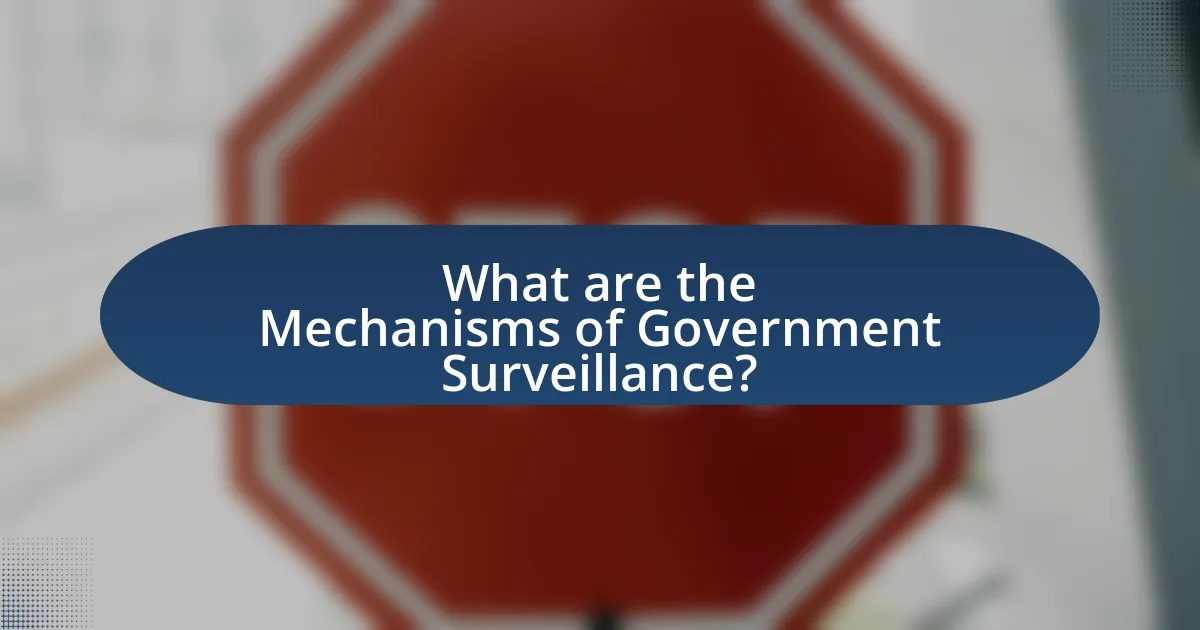
What are the Mechanisms of Government Surveillance?
Government surveillance mechanisms include data collection, monitoring of communications, and the use of technology to track individuals. These mechanisms are often implemented through legal frameworks that allow agencies to access personal information from various sources, such as internet service providers and telecommunications companies. For example, the USA PATRIOT Act enables law enforcement to conduct surveillance on suspected individuals without a warrant under certain conditions. Additionally, technologies like facial recognition and location tracking through mobile devices enhance the government’s ability to monitor citizens. Reports from organizations like the Electronic Frontier Foundation highlight the extensive use of these surveillance methods, indicating a growing concern over privacy rights and civil liberties.
How do governments conduct surveillance on citizens?
Governments conduct surveillance on citizens through various methods, including electronic monitoring, data collection, and physical observation. Electronic monitoring involves the use of technologies such as closed-circuit television (CCTV), internet tracking, and phone tapping to gather information about individuals’ activities. Data collection often occurs through the analysis of online behavior, social media interactions, and the use of algorithms to identify patterns of behavior. Physical observation can include the deployment of law enforcement personnel to monitor public spaces or specific individuals.
For instance, the USA PATRIOT Act, enacted after the September 11 attacks, expanded the government’s ability to conduct surveillance, allowing for increased monitoring of communications and financial transactions. Additionally, reports indicate that many governments utilize advanced technologies, such as facial recognition systems and artificial intelligence, to enhance their surveillance capabilities. These practices raise significant concerns regarding privacy and civil liberties, prompting ongoing debates about the balance between security and individual rights.
What technologies are commonly used for surveillance purposes?
Common technologies used for surveillance purposes include closed-circuit television (CCTV), drones, biometric systems, and internet monitoring tools. CCTV systems are widely deployed in public spaces for real-time monitoring and recording, with millions of cameras installed globally, enhancing security and crime prevention. Drones equipped with cameras provide aerial surveillance capabilities, allowing for monitoring of large areas from above. Biometric systems, such as facial recognition technology, analyze unique physical characteristics for identification and tracking, increasingly utilized by law enforcement agencies. Internet monitoring tools, including data mining and network analysis software, enable the collection and analysis of online activities, often employed by governments to track communications and behavior. These technologies collectively contribute to extensive surveillance capabilities, raising concerns about privacy and civil liberties.
How do legal frameworks support or limit surveillance activities?
Legal frameworks can both support and limit surveillance activities depending on their provisions and interpretations. Support for surveillance often comes from laws that grant government agencies broad authority to monitor communications for national security or law enforcement purposes, such as the USA PATRIOT Act, which expanded surveillance capabilities post-9/11. Conversely, limitations are imposed by laws that protect individual privacy rights, such as the General Data Protection Regulation (GDPR) in the European Union, which restricts data collection and mandates consent for personal data processing. These frameworks create a balance between enabling surveillance for security and protecting citizens’ rights, as seen in various court rulings that have challenged overreach in surveillance practices.
What are the ethical considerations surrounding government surveillance?
The ethical considerations surrounding government surveillance primarily involve the balance between national security and individual privacy rights. Governments often justify surveillance as a means to protect citizens from threats, yet this can infringe on personal freedoms and civil liberties. For instance, the USA PATRIOT Act, enacted after the September 11 attacks, expanded surveillance capabilities but raised concerns about the erosion of privacy rights. Additionally, ethical dilemmas arise regarding consent, as many individuals are unaware of the extent of surveillance or have not explicitly agreed to it. The implications of mass data collection can lead to discrimination and profiling, further complicating the ethical landscape. Thus, while surveillance may serve a protective function, it poses significant ethical challenges that require careful consideration and oversight.
How do ethical concerns influence public opinion on surveillance?
Ethical concerns significantly shape public opinion on surveillance by fostering distrust in government practices. When citizens perceive surveillance as an invasion of privacy or a violation of civil liberties, they often express opposition to such measures. For instance, a 2019 Pew Research Center survey indicated that 81% of Americans felt that the potential risks of government surveillance outweighed the benefits. This sentiment is rooted in ethical considerations regarding individual rights and the potential for abuse of power, leading to increased advocacy for digital rights and reforms aimed at limiting surveillance practices.
What role do whistleblowers play in exposing surveillance practices?
Whistleblowers play a crucial role in exposing surveillance practices by revealing information about government and corporate activities that violate privacy rights. For instance, Edward Snowden’s disclosure of the National Security Agency’s mass surveillance programs in 2013 highlighted the extent of government monitoring and prompted global debates on privacy and civil liberties. Such revelations often lead to public outcry, legislative changes, and increased scrutiny of surveillance practices, thereby reinforcing the importance of transparency and accountability in digital rights.
What are the consequences of unchecked government surveillance?
Unchecked government surveillance leads to significant violations of privacy rights, erosion of civil liberties, and potential abuse of power. When governments monitor citizens without oversight, it creates a chilling effect on free speech and dissent, as individuals may self-censor due to fear of being watched. Historical examples, such as the NSA’s mass surveillance programs revealed by Edward Snowden in 2013, demonstrate how unchecked surveillance can lead to widespread data collection on innocent individuals, undermining trust in government institutions. Additionally, studies indicate that excessive surveillance can disproportionately target marginalized communities, exacerbating social inequalities and fostering discrimination.
How does surveillance affect marginalized communities?
Surveillance disproportionately affects marginalized communities by exacerbating existing inequalities and fostering an environment of fear and mistrust. Research indicates that these communities often experience heightened scrutiny from law enforcement and government agencies, leading to over-policing and racial profiling. For instance, a report by the American Civil Liberties Union (ACLU) highlights that Black and Latino individuals are more likely to be monitored and targeted by surveillance technologies, which can result in wrongful arrests and increased criminalization. Additionally, the pervasive nature of surveillance can deter individuals from exercising their rights, such as free speech and assembly, further marginalizing these groups.
What are the potential risks of data breaches in surveillance systems?
Data breaches in surveillance systems pose significant risks, including unauthorized access to sensitive personal information, which can lead to identity theft and privacy violations. Such breaches can compromise the integrity of surveillance data, allowing malicious actors to manipulate or misuse the information for criminal activities. According to a 2020 report by the Identity Theft Resource Center, data breaches in various sectors, including surveillance, have increased by 17% compared to the previous year, highlighting the growing vulnerability of these systems. Additionally, the exposure of surveillance footage can result in public embarrassment or reputational damage for individuals, further emphasizing the potential harm caused by these breaches.
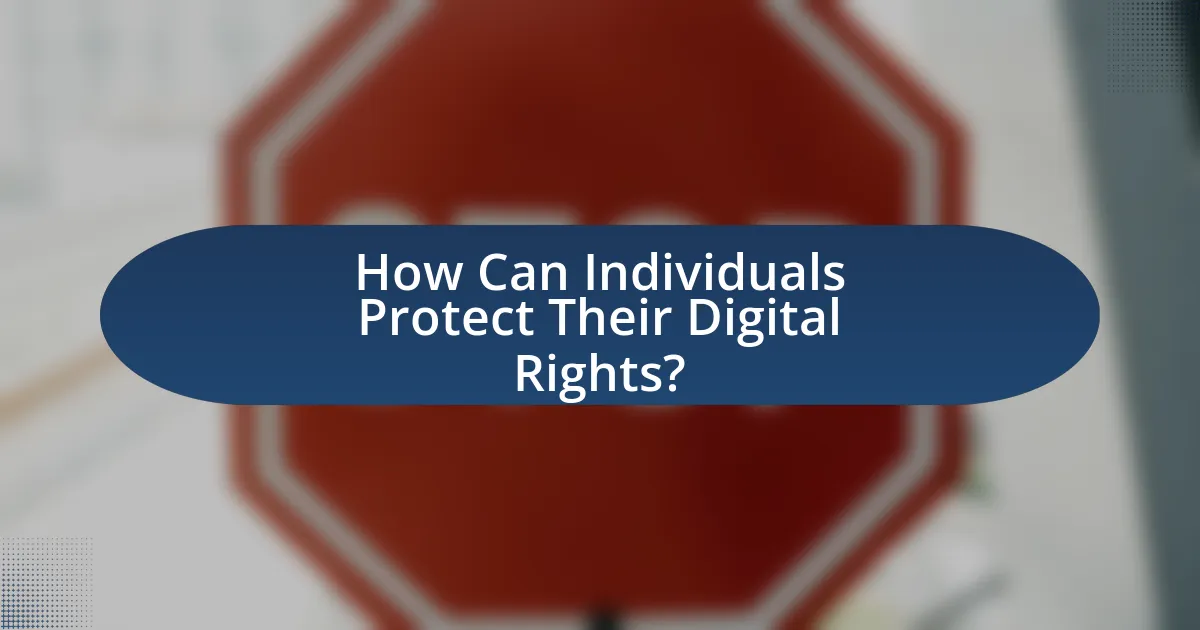
How Can Individuals Protect Their Digital Rights?
Individuals can protect their digital rights by utilizing strong encryption, employing privacy-focused tools, and being aware of their online activities. Strong encryption, such as using end-to-end encrypted messaging apps like Signal, ensures that communications remain private and secure from unauthorized access. Privacy-focused tools, including virtual private networks (VPNs) and ad blockers, help shield personal data from surveillance and tracking by third parties. Additionally, individuals should regularly review privacy settings on social media platforms and be cautious about sharing personal information online. According to a 2021 report by the Electronic Frontier Foundation, using these methods significantly reduces the risk of data breaches and unauthorized surveillance, thereby enhancing individual digital rights.
What strategies can individuals use to safeguard their privacy?
Individuals can safeguard their privacy by employing strategies such as using strong, unique passwords, enabling two-factor authentication, and utilizing encryption tools. Strong passwords reduce the risk of unauthorized access, as studies show that 81% of data breaches are linked to weak passwords. Two-factor authentication adds an additional layer of security, making it harder for attackers to gain access even if they have the password. Encryption tools protect sensitive data by converting it into a secure format that can only be read by authorized users, thereby ensuring that personal information remains confidential. Additionally, individuals should regularly update their software to patch vulnerabilities, limit the sharing of personal information on social media, and use privacy-focused browsers and search engines to minimize tracking.
How effective are encryption tools in protecting personal data?
Encryption tools are highly effective in protecting personal data by converting it into a format that is unreadable without the correct decryption key. This process ensures that even if data is intercepted during transmission or accessed without authorization, it remains secure and confidential. According to a study by the Ponemon Institute, 70% of organizations that implemented encryption reported a significant reduction in data breaches. Additionally, encryption is a critical component of data protection regulations, such as the General Data Protection Regulation (GDPR), which mandates that personal data must be adequately protected to prevent unauthorized access. Thus, the effectiveness of encryption tools in safeguarding personal data is well-supported by both empirical evidence and regulatory frameworks.
What role does digital literacy play in protecting digital rights?
Digital literacy plays a crucial role in protecting digital rights by equipping individuals with the knowledge and skills necessary to navigate online environments safely and responsibly. This understanding enables users to recognize their rights, such as privacy and data protection, and to identify potential threats like government surveillance. For instance, a study by the Pew Research Center found that individuals with higher digital literacy are more likely to take steps to protect their personal information online, thereby reducing their vulnerability to invasive surveillance practices.
What organizations advocate for digital rights and privacy?
Organizations that advocate for digital rights and privacy include the Electronic Frontier Foundation (EFF), Privacy International, and the American Civil Liberties Union (ACLU). The EFF focuses on defending civil liberties in the digital world, actively engaging in litigation and policy advocacy to protect user privacy. Privacy International works globally to challenge government surveillance and promote privacy rights, emphasizing the importance of data protection. The ACLU addresses issues related to government surveillance and advocates for the protection of individual rights in the digital age through legal action and public education. These organizations provide critical resources and support for individuals facing privacy violations and work to influence legislation that impacts digital rights.
How can individuals get involved in the fight against surveillance?
Individuals can get involved in the fight against surveillance by advocating for stronger privacy laws and supporting organizations that promote digital rights. Engaging in activism, such as participating in protests or campaigns organized by groups like the Electronic Frontier Foundation, can raise awareness about surveillance issues. Additionally, individuals can educate themselves and others about privacy tools, such as encryption software, which can help protect personal data. Supporting legislation that limits government surveillance powers, like the USA Freedom Act, is another effective way to contribute to this cause.
What resources are available for learning about digital rights?
Resources available for learning about digital rights include organizations, online courses, and literature focused on privacy and surveillance issues. Notable organizations such as the Electronic Frontier Foundation (EFF) and Access Now provide extensive educational materials, reports, and advocacy tools related to digital rights. Online platforms like Coursera and edX offer courses on digital privacy and rights, often created by universities and experts in the field. Additionally, books such as “Privacy, Big Data, and the Public Good” edited by Julia Lane et al., and “The Age of Surveillance Capitalism” by Shoshana Zuboff provide in-depth analysis and context on the implications of surveillance and digital rights. These resources collectively enhance understanding of the complexities surrounding digital rights and government surveillance.
What are best practices for maintaining digital privacy?
Best practices for maintaining digital privacy include using strong, unique passwords for each account, enabling two-factor authentication, and regularly updating software to protect against vulnerabilities. Strong passwords reduce the risk of unauthorized access, while two-factor authentication adds an additional layer of security. Regular software updates patch security flaws, making it harder for attackers to exploit systems. According to a 2021 report by the Cybersecurity & Infrastructure Security Agency, 80% of data breaches involve weak or stolen passwords, highlighting the importance of these practices in safeguarding personal information.
How can individuals stay informed about changes in surveillance laws?
Individuals can stay informed about changes in surveillance laws by regularly following reputable news sources, legal blogs, and government websites that publish updates on legislation. For instance, organizations like the Electronic Frontier Foundation and the American Civil Liberties Union provide timely analyses and summaries of relevant legal changes. Additionally, subscribing to newsletters from these organizations or using legal tracking services can ensure that individuals receive notifications about new laws and amendments as they occur.
What steps can be taken to minimize digital footprints?
To minimize digital footprints, individuals can take several proactive steps. First, using privacy-focused search engines like DuckDuckGo instead of mainstream options can reduce data tracking. Second, employing a Virtual Private Network (VPN) encrypts internet traffic, making it harder for third parties to monitor online activities. Third, regularly adjusting privacy settings on social media platforms limits the amount of personal information shared publicly. Fourth, deleting unused accounts and opting out of data broker services can significantly decrease the amount of personal data available online. Lastly, utilizing browser extensions that block trackers and ads, such as uBlock Origin or Privacy Badger, further enhances online privacy. These actions collectively contribute to a reduced digital footprint, thereby enhancing personal privacy and security.
